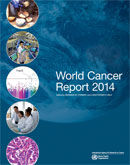World Cancer Report 2014
"Extend tobacco-style restrictions to alcohol"
When The World Cancer Report 2014 was launched last month, a United Nations statment called for multipronged preventive action including treaties and laws extending tobacco-style restrictions to alcohol and sweetened beverages.
"Treatment alone will not win war on cancer: prevention is crucial," states the World Cancer Report 2014. The comprehensive status report on the global cancer situation is issued by the International Agency for Research on Cancer, the specialized cancer agency of the World Health Organization. The book provides a unique global view of cancer, including cancer patterns, causes, and prevention. The World Cancer Report series is recognized as an authoritative source of global perspective and information on cancer. The first volume appeared in 2003 and the second in 2008. This third volume in the series, World Cancer Report 2014, encompasses both established knowledge and recent research achievement.
The United Nations reports that with new cancer cases worldwide expected to rise from 14 million to 22 million per year within the next two decades, and annual cancer deaths rising from 8.2 million to 13 million, the United Nations today called for multipronged preventive action including treaties and laws extending tobacco-style restrictions to alcohol and sweetened beverages.
As an example of preventive strategies the report highlights the need for adequate legislation to reduce exposure and risk behaviours, citing the first international treaty sponsored by WHO, the Framework Convention on Tobacco Control, as critical to reducing tobacco consumption, a major contributor to lung and other cancers, through taxes, advertising restrictions, and other regulations and measures to control and discourage its use of tobacco.
Similar approaches need to be evaluated in other areas, notably consumption of alcohol and sugar-sweetened beverages, and in limiting exposure to occupational and environmental carcinogenic risks, including air pollution, it stresses, noting that about half of all cancers, whose total annual economic cost is estimated to reach approximately $1.16 trillion, could be avoided if current knowledge was adequately implemented.
Due to growing and ageing populations, developing countries are disproportionately affected, with more than 60 per cent of cases and 70 per cent of deaths occurring in Africa, Asia, and Central and South America.
See also:
IOGT International President, Sven-Olov Carlsson's Blog: Alcohol Fuelled Global Cancer Epidemic – 4 Facts To Turn The Tide
RELATED ARTICLES
- New report highlights benefits of policy measures to prevent harmful alcohol consumption
- Highlighting the COVID-19 – alcohol connection
- Alcohol among risk factors increasing
- WHO Launches Global status report on alcohol and health 2018
- Effective alcohol policies are needed now to yield health benefits in the future
- Alcohol as an obstacle to development
- Alcohol use a significant cancer risk factor
- New policy programmes and a new leadership
- Prevention Works
- Alcohol and Development

